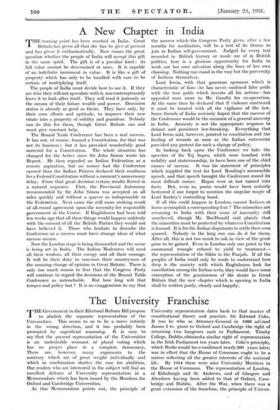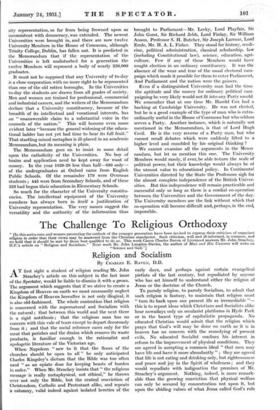The University Franchise
THE Government in their Electoral Reform Bill propose to abolish the separate representation of the Universities. This seems to us to be a move entirely in the wrong direction, and it has probably been prompted by superficial reasoning. It is easy to say that the present representation of the Universities is an undesirable remnant of plural voting which has no proper place in a complete democracy. There are, however, many arguments to the contrary which are of great weight individually and which in combination shatter the case for abolition. Our readers who are interested in the subject will find an excellent defence of University representation in a Memorandum which has been issued by the Members for Oxford and Cambridge Universities.
As this Memorandum points out, the principle of University representation dates back to that master of constitutional theory and practice. Sir Edward Coke. It was he who as Attorney-General in 1603 advised James I to grant to Oxford and Cambridge the right of returning two burgesses each to Parliament. Trinity College, Dublin, obtained a similar right of representation in the Irish Parliament ten years later. Coke's principle, which Burke would have confirmed nearly 200 years later, was in effect that the House of Commons ought to be a mirror reflecting all the greater interests of the national life. By 1914 there were nine University Members in the House of Commons. The representation of London, of Edinburgh and St. Andrews, and of Glasgow and Aberdeen having been added to that of Oxford, Cam- bridge and Dublin. After the War, when there was a great extension of the franchise, the principle of 'Univer- sity representation, so far from being frowned upon as inconsistent with democracy, was extended. The newest Universities were brought in, and there are now twelve University Members in the House of Commons, although Trinity College, Dublin, has fallen out. It is predicted in the Memorandum that if the representation of the Universities is left undisturbed for a generation the twelve Members will represent a body of nearly 250,000 graduates.
It must not be supposed that any University of to-day is a close corporation with no more right to be represented than one of the old rotten boroughs. In the Universities to-day the students -are drawn from all grades of society. Men and women are trained for professional, commercial and industrial careers, and the writers of the Memorandum declare that a University constituency, because of the breadth of its intellectual and vocational interests, has an " unanswerable claim to a substantial voice in the counsels of the nation." This will become even more evident later "because the general widening of the educa- tional ladder has not yet had time to bear its full fruit." That startling mixed metaphor is ill-placed in an academic Memorandum, but its meaning is plain.
The Memorandum goes on to insist in some detail upon the catholicity of the Universities. No boy of brains and application need be kept away for want of money. In the year 1928-29 less than half-630 only— of the undergraduates at Oxford came from English Public Schools. Of the remainder 179 were Overseas students ; 445 were from Secondary Schools, and of these 228 had begun their education in Elementary Schools.
So much for the character of the University constitu- encies. The intellectual equipment of the University members has always been in itself a justification of University representation. The very names suggest the versatility and the authority of the information thus brought to Parliament—Mr. Lecky, Lord Playfair, Sir John Gorst, Sir Richard Jebb, Lord Finlay, Sir William Anson, Professor S. H. Butcher, Sir Joseph Larmor, Lord Ernie, Mr. H. A. L. Fisher. They stood for history, medi- cine, political administration, classical scholarship, law (including Constitutional law), science, education, agri- culture. Few if any of these Members would have sought election in an ordinary constituency. It was the absence of the wear and tear of the usual electoral cam- paign which made it possible for them to enter Parliament. And Parliament and the nation were the gainers.
Even if a distinguished University man had the time the aptitude and the money for ordinary political cam• paigning he very likely would not fit into any Party mould. We remember that at one time Mr. Harold Cox had a backing at Cambridge University. He was not elected, but he is a good example of the type of man who is extra- ordinarily useful in the House of Commons but who seldom serves a Party. Another instance, which is naturally not mentioned in the Memorandum, is that of Lord Hugh Cecil. He is the very reverse of a Party man, but who cannot recall debates which were suddenly lifted to a higher level and ennobled by his original thinking ?
We cannot examine all the arguments in the Memo- randum, but let us mention this one. The University Members would rarely, if ever, be able to turn the scale of political power, but their knowledge would always be of the utmost value to educational policy. In Continental Universities directed by the State the Professors sigh for the almost complete independence of the British Univer- sities. But this independence will remain practicable and successful only so long as there is a cordial co-operation between the Universities and the Government of the day. The University members are the link without which that co-operation will become difficult and, perhaps, in the end, impossible.







































 Previous page
Previous page